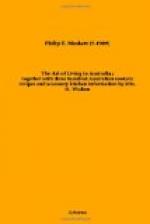A sample of Alto Douro wine submitted to these gentlemen, although it was slightly alcoholised, yet possessed the following desirable qualities: it was fine, because it was derived from the finest and ripest Alto Douro grapes, the Verdeilho and Bastardo; it was full, owing to its great vinosity and high amount of natural alcohol, yet free from adventitious syrup; and it was pure, because free from all those faults which depreciate so many southern wines, such as the fousel flavour, or the burning taste of distilled spirit. Besides all these great qualities, it characteristically possessed the very essence of an ideal port wine flavour—without the saccharine and spirituous taste commonly found in port wine—and it had a natural smooth astringency such as pleases the palate and imparts keeping qualities.
Moreover, it was very unlike the artificial sweet and burning products commonly called port wine. It was thoroughly fermented, and contained such a minute quantity of grape sugar that the latter could not be possibly detected by the taste. It was perfectly dry, and thereby differed entirely from ordinary port wines, which contain from 2 to 6 per cent. of sugar. Its alcoholicity was certainly below all the port wines usually sold. With all these desirable qualities, therefore, it possessed high dietetic and hygienic virtues, and refreshed the system like Burgundy or Medoc wine.
It will be convenient to make reference here to two terms about which there is a great deal of confusion. It is the difference between the “aroma” and the “bouquet” of wine. Now, the Settimana Vinicola has recently well observed that although these two are usually supposed to be the same, yet they are entirely different. The aroma of a wine is altogether distinct from those agreeable and delicate odours known by the name of “bouquet.” For instance, some American grapes have what is called a “foxy” smell, and the wine prepared from them has this aroma, which is perceptibly disagreeable. Aroma pre-exists in certain grapes, and during vinification will pass into the resulting wine. On the other hand, perfume, the bouquet of the French, as it has been pointed out by Professor G. Grazzi-Soncini, is the complex sensation produced simultaneously on the palate and nose, owing to the intimate connection between these two organs, and which has already been referred to. This bouquet is due to the action of the ethers, which are formed during the life of the wine. The Corriere del VILLAGIO remarks, in addition to the preceding, that there is a chemical difference between the “aroma” and the “bouquet” of wine. The former is produced chiefly by one or more carburets of hydrogen, and their oxidation derivatives. The bouquet, however, results from the admixture of aldehydes with one or more essential oils and various ethers, produced by combination of fatty and other acids with ethylic and other alcohols, and from these changes result the different ethers which constitute the bouquet of wine.




